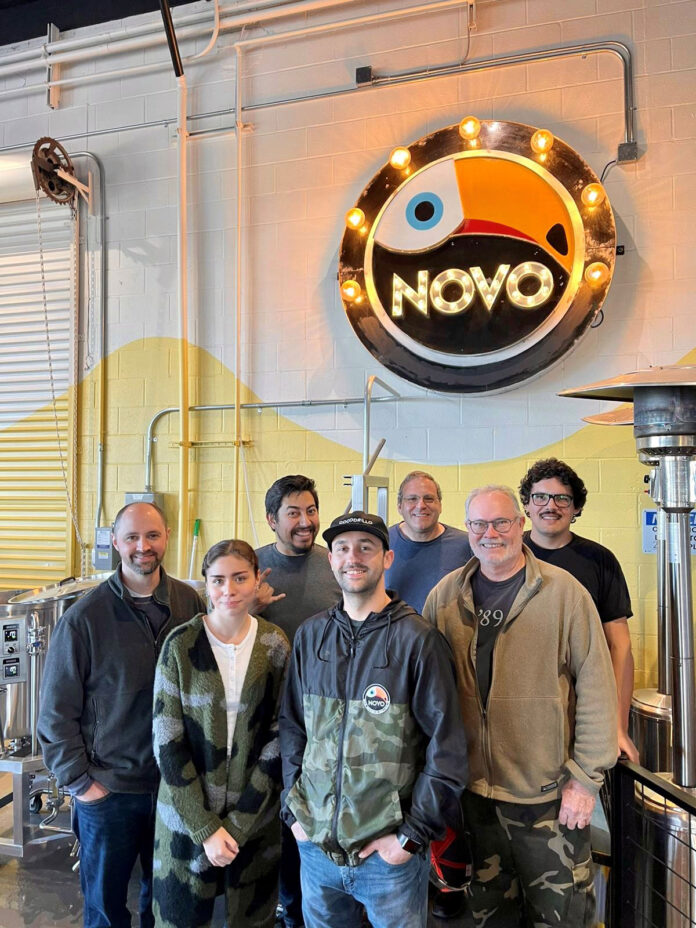
Southwestern College Fermentation Science Program students collaborated with NOVO Brazil Brewing Company to create Tzunúm, an Australian Pale Ale now available at the brewery’s Imperial Beach location. This is the first time students have brewed outside of the classroom and in a professional brewery. Participating students were Amanda Esquivel-Chacon, Fred Hafer, Zackary Lieras, and Matthew Pineda.
Tzunúm, which is Mayan for hummingbird, was named by the students for its lightness and summerish features. It has a light golden color, steady white head, and a 5.5% alcohol by volume. The beer is slightly hazy, and it features a citrus and fresh lime zest from a single hop of Wakatu.
“NOVO Brazil has been an amazing supporter and partner of our program, and we are very grateful for this amazing experience for our students,” said David Hecht, Ph.D., a professor of chemistry at Southwestern.
Hecht said the college started Intro Into the Science of Brewing Beer class in 2018, with the goal of having a general education class for science majors to fulfill their life science requirement for California State universities.
“In this class we talk about the chemistry as well as the biology behind the brewing process,” he said. “So I partnered up with Charlie Hoyt, a microbiologist, as well as Bill Greenleaf who is also a biochemist, biologist, microbiologist.”
Hecht said the idea of the class was to “sneak in the science in the context of beer,” talk about the brewing process, the engineering, and the history and cultural aspect of beer and its influence through different civilizations and societies, with the main focus on its history in America.
The class runs about an hour and a half, with the first hour of lecture material, then there is a tasting component.
“Each class we bring in a beer from a different country, a different beer style, have slides that show what makes that style unique, its characteristics, then we actually have a sampling,” he said.
Due to the fact that Southwestern is a community college and drinking alcohol on campus is prohibited, students can only taste the beer, then spit it out. But Hecht said it has worked out, and 75% of the beer they have sampled the students or himself have never heard of. He said in 2019, the class started a science lab, with a mini brewery setup.
Hecht said NOVO brewers Jin Brought and Guilherme Hoffman had been guest speakers for the class, and that is how they made the connection with NOVO Brazil. They participated in a couple of brews in the science lab, and Hecht said they were excited, and invited them to come to the Imperial Beach location for its opening.
“Unfortunately, with COVID we had to put our lab on hold. We were mostly working remote via Zoom,” he said. “This was our first chance to get back in the lab and have field trips,” he said. “Ji offered to brew one of our pale ale beers,” he said.
Hecht said they looked it over, made a few modifications, and then it was brewed at NOVO.
“For the students it was an amazing experience,” he said. “Everything we talked about in class and lab, they saw on a large scale and got to be a part of that. The students came up with the name Tzunúm, which is Mayan for hummingbird.”
Hecht said he is hopeful they will be invited back for another brew at any of its locations. Novo Brazil has two locations in Chula Vista, and its newest in Imperial Beach.
Hecht said the class does not come with a certificate, yet, but is something they are looking at in the future. Nevertheless it still fills their life science requirement.
“For a student who is not a STEM or science major, better than taking BIO 101, they can take this class, Intro Into the Science of Brewing Beer,” he said.
Hecht said currently, there are openings in the classes and he hopes more students are interested in another pathway to general educational science.
